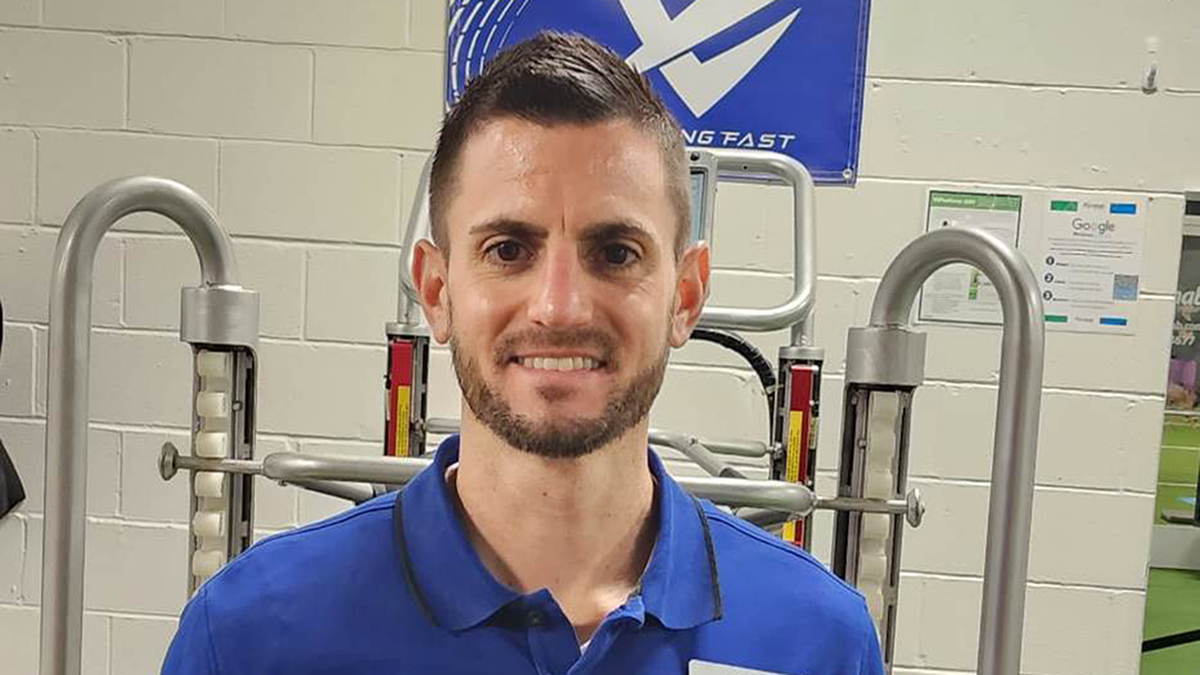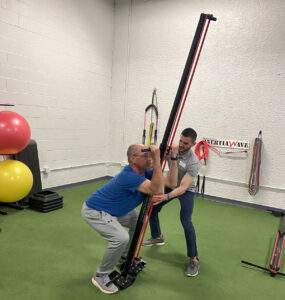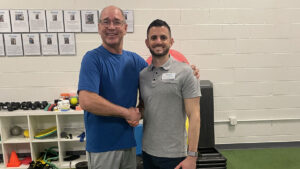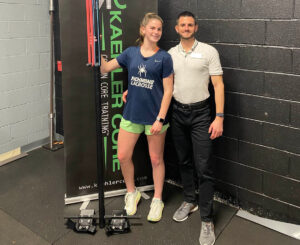
Physical Therapist Michael St. George has spent 10 years taking injured teen and adult athletes and non-athletes by helping them become healthy and well and get their groove back.
The clinical director of Ivy Rehab Physical Therapy in Warminster, PA., Michael St. George has learned vital lessons from working with many individuals from an array of professions and backgrounds including some semi-pro athletes. What he has learned, and taught, can help all of us regardless of our activity level.
St. George combines his extensive training, positive outlook, motivational techniques, upbeat personality, and continuing education to help his patients where ever they are in the process. The thrust is providing exceptional care and personalized treatment to get each patient on the path to a speedier and more complete recovery.
“The amateur and semi-pro athletes that put their money towards investing in their health and self-care have longevity in their careers,” says St. George.
“I believe in hands-on components, such as soft tissue work and hands-on cueing,” he explains. “You can’t just tell someone to activate their core or use this muscle; you have to re-teach them to re-use those muscle patterns.”
Typical physical therapy offered at clinics, therapy centers, and medical practices can often be outdated and primarily based on home exercises, basic equipment, or stretches, while St. George believes in a “more challenging and functional approach,” that leads to patients getting better faster and maintaining their health and wellness.
He frequently hears from new patients whose previous physical therapy clinic has “fallen into a rut” where it tends to focus on implementing the same techniques and symptom management, mostly due to the high volume of patients seen each day. This often prohibits the therapist from truly addressing the patient and their deficits.
“My facility is different because of the focus on more individualized care with a treatment approach that targets the patients’ deficits and causes for injury in the first place,” explained St. George. “Then the home exercises programs complement the therapy sessions.”
An important quote that I got from one of my mentors, coach, and four-time world Olympic Rowing Champion Bob Kaehler is that “you can’t learn how to ride a bike by reading a book; you have to do it.”
Extremely skilled physical therapists understand human movement and performance and understand how to teach and correct movement patterns because they know what it is supposed to feel like. The patient has to feel for proper positioning to understand the control of their body.
“Our treatment is interactive and aggressive. It is about getting people to move better, faster, and more effectively. Every session is different. We work on strength training, form, technique, resistance, and they keep getting better and they keep progressing.”
The training St. George has received involves numerous hours of shadowing and working with noted physicians and surgeons, as well as a certified hand therapist for hand specialties. His treatment approach involves the Functional Movement Systems philosophy, an array of manual therapy techniques, and a human performance mindset.
What St. George does not want to see is high school athletes spending their teenage years in rehab. He is also concerned about the epidemic of youth and adolescent injuries nationwide and that this is happening at younger ages.
He also says that he sees a lot of teens focused on one sport all year round, but they need to be developing all of the muscle groups and becoming well-rounded. Without this, it can lead to torn ligaments or other sports-related injuries.
Mark Palage of Southampton, a patient who worked with St. George for more than a year after a near-fatal motorcycle accident, says that St. George takes his craft, the art, and the science of physical therapy more than seriously.
“Mike St. George doesn’t want to be the baseline. He is the new school guy,” Palage recently explained. “Mike got me back on my feet and back to work when my doctors doubted that I would walk, drive or get back to work as an electrician for years. Mike is extremely proud of his patients. When they succeed; he succeeds. He wants to celebrate with you!”

The following is a Q and A with expert Physical Therapist Michael St. George on keeping our active teens and adults healthy:
What advice do you have for high school students involved in sports to stay healthy and prevent injuries?
Allow an “off-season” time for rest and recovery and downtime from the primary sport of focus. Everyone needs to make some time for strength training. Resistance training and weights reveal major health benefits overall. Consider a nutrition plan appropriate for your lifestyle. Mobility and hydration/nutrition preparation are also foundational principles for all of us, especially young athletes.
What mistakes do athletes make that can lead to difficulties and injuries?
Overtraining and improper balance of rest and recovery. Feeling the need to go “beast mode” with every workout or practice is not recommended. Early specialization without focusing on foundational work will not hold you in good stead. If you want to specialize in a sport, then there needs to be time to focus on sleep, recovery, diet, nutrition, workload, and mental health balance.
Early specialization can often be detrimental to youth development, yet some people love one sport and really want to focus on it which is fine, but there needs to be a lifestyle balance.

What are the main things you learned as an experienced physical therapist that you want your patients to understand?
People pay for what they want not what they need. Commitment to preventing an injury or overcoming an injury cannot be short-changed. Physical therapy can have massive benefits for preventing issues instead of waiting to fix things when they break. When it comes to health and wellness, I believe in preventative not reactive.
What have you learned about health/wellness/body awareness from semi-pro athletes?
The amateur and semi-pro athletes that put their money towards investing in their health and self-care have longevity in their careers. Those who take it seriously invest in their own personal trainers and a team of dietitians, nutritionists, and physical therapists.
What advice do you have for someone who hasn’t exercised in months or years and wants to get started?
Start with general movement, and bodyweight activity first. Understand how to move your body and demonstrate good form and technique with higher volume before adding intensity and resistance. Here is an example: do sets and reps of bodyweight squats with good form and ensure no issues before adding weight.
How do you monitor your progress with various patients?
Progress can be measured by the number of reps/sets completed, level of intensity and rate of perceived exertion, and time it takes to complete a set amount of exercise. Don’t alter too many variables at once.
Work with the same amount for a set number of weeks and adjust one variable at a time whether it be the number of reps of exercise, time, or weight. Varying too many things at once can make it hard to track progress or result in setbacks.
What is the best health and wellness tip you ever received and from whom?
For a few years, I trained in combat art and Gracie Jujitsu with a private expert and he said in ancient Chinese culture there is a saying that if you never use your arms to get out of a chair, you will never need a cane. It’s a simple analogy to the fact that if you always continue to use and take care of your body the way it’s supposed to function, you will always be able to do the things you need to do.

What are a few things that people forget about when it comes to their health and wellness that can harm them now or down the line?
Life is a pay now or pay later investment experience. You either put the work in now to take care of yourself or you pay for the consequences later. People think that it’s hard work and time-consuming to set aside time to take care of themselves when they are generally healthy, it’s even harder when you are ridden with disease or coming back from surgery. Lifting weights isn’t scary, but being too weak to take care of yourself or your loved ones is scary. You wouldn’t go weeks without brushing your teeth, so why would you go weeks without daily exercise?
For more information please contact, Michael St. George PT, DPT at Ivy Rehab Physical Therapy:
Website: www.ivyrehab.com
Phone: 215-987-3677
Email: [email protected]